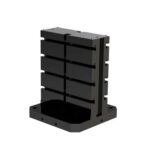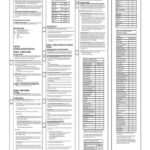Understanding PCB Basics
Before diving into the process of ordering PCBs from China, it’s important to understand the basics of PCBs. A PCB is a flat board made of insulating material, such as fiberglass, with conductive pathways printed on its surface. These pathways connect various electronic components, such as resistors, capacitors, and integrated circuits, to form a complete electronic circuit.
PCBs come in different types, depending on the number of layers and the material used:
| PCB Type | Description |
|---|---|
| Single-sided PCB | Has conductive traces on one side of the board |
| Double-sided PCB | Has conductive traces on both sides of the board |
| Multi-layer PCB | Has multiple layers of conductive traces separated by insulating material |
| Flexible PCB | Made of flexible materials, such as polyimide, for use in compact or bendable devices |
| Rigid-Flex PCB | Combines rigid and flexible PCBs for more complex designs |
Choosing a PCB Manufacturer in China
When selecting a PCB manufacturer in China, consider the following factors:
1. Experience and Reputation
Look for a manufacturer with a proven track record of producing high-quality PCBs. Read reviews from previous customers and check their industry certifications, such as ISO 9001 and UL.
2. Manufacturing Capabilities
Ensure that the manufacturer has the necessary equipment and expertise to produce PCBs that meet your specific requirements, such as layer count, material, and surface finish.
3. Communication and Support
Choose a manufacturer with a responsive and knowledgeable support team that can guide you through the ordering process and address any concerns you may have.
4. Pricing and Lead Time
Compare pricing and lead times from multiple manufacturers to find the best value for your project. Keep in mind that the lowest price may not always be the best option if it compromises quality or delivery time.
Steps to Order PCB from China
Once you have chosen a PCB manufacturer, follow these steps to place your order:
Step 1: Prepare PCB Design Files
Create your PCB design using electronic design automation (EDA) software, such as Altium Designer, Eagle, or KiCad. Ensure that your design adheres to the manufacturer’s design guidelines, including minimum trace width, clearance, and hole size.
Step 2: Generate Gerber and Drill Files
Export your PCB design as Gerber and drill files, which are the industry-standard formats for PCB manufacturing. Gerber files contain information about the copper layers, solder mask, and silkscreen, while drill files specify the location and size of holes on the PCB.
Step 3: Request a Quote
Submit your Gerber and drill files to the manufacturer and request a quote. Provide information about your PCB specifications, such as the number of layers, material, thickness, surface finish, and quantity.
Step 4: Review and Approve the Quote
Review the quote provided by the manufacturer and ensure that it meets your requirements and budget. If necessary, discuss any modifications or clarifications with the manufacturer before approving the quote.
Step 5: Place the Order and Make Payment
Once you have approved the quote, place your order and make the payment according to the manufacturer’s instructions. Most manufacturers accept payment via bank transfer, credit card, or online payment platforms like PayPal.
Step 6: Track the Production Progress
After placing your order, the manufacturer will provide you with an estimated lead time for production and delivery. Keep in touch with the manufacturer to track the progress of your order and address any issues that may arise.
Step 7: Receive and Inspect the PCBs
Upon receiving the PCBs, inspect them carefully for any defects or discrepancies. If you find any issues, contact the manufacturer immediately to discuss a resolution, such as a replacement or refund.

Frequently Asked Questions (FAQ)
1. What is the minimum order quantity (MOQ) for PCBs from China?
The MOQ varies among manufacturers but typically ranges from 5 to 100 pieces. Some manufacturers may offer lower MOQs for prototype or small-batch orders.
2. How long does it take to receive PCBs from China?
Lead times depend on the complexity of your PCB design and the manufacturer’s workload. Typical lead times range from 5 to 15 working days, excluding shipping time. Expedited production options may be available for an additional cost.
3. What shipping methods are available for PCBs from China?
Most manufacturers offer various shipping options, such as DHL, FedEx, UPS, and EMS. The choice of shipping method depends on your budget, desired delivery speed, and the size of your order.
4. How can I ensure the quality of PCBs from China?
To ensure the quality of your PCBs, choose a reputable manufacturer with a proven track record and industry certifications. Clearly communicate your requirements and specifications, and request a sample or prototype before placing a large order.
5. Can I request custom PCB features or materials?
Yes, most manufacturers in China offer a wide range of customization options, such as custom PCB shapes, special materials, and additional surface finishes. Discuss your specific requirements with the manufacturer to determine feasibility and any associated costs.
Conclusion
Ordering PCBs from China can be a cost-effective and efficient solution for your electronic projects. By understanding the basics of PCBs, choosing a reliable manufacturer, and following the ordering steps outlined in this article, you can ensure a smooth and successful experience. Remember to communicate clearly with your chosen manufacturer, track the progress of your order, and inspect the received PCBs thoroughly to guarantee the best possible outcome for your project.






Leave a Reply